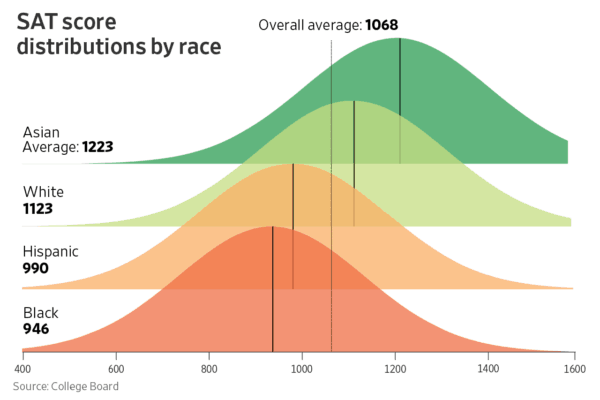As Colleges Move To Do Away With The SAT In The Name Of Diversity, Detroit High School Valedictorian Struggles With Low-Level Math
Luke Rosiak, Daily Caller, December 3, 2019

The valedictorian of a Detroit high school is reportedly struggling with basic math in college.
The development comes as colleges have increasingly rejected objective admissions criteria in the name of “equity,” with University of California poised to no longer require the SAT because of the racial impact it has on admissions.
“Marqell McClendon has struggled in the low-level math class she’s taking during her first semester at Michigan State University,” the news outlet Chalkbeat reported Nov. 15. McClendon, the valedictorian of her graduating class at Detroit’s Cody High School, was used to getting all A’s, but found herself asking strangers to help her with her college coursework, it said.
MSU has pushed for admitting more racial minorities in the name of diversity. Its “incoming freshman class is predicted to be the largest and most diverse in the school’s history, with more than 8,400 anticipated students,” the school stated in May 2018, noting that black enrollment was up 24%.
But nearly half of graduates from Detroit’s main school district must take remedial courses when they get to college, Chalkbeat reported.
In 2016, MSU removed the requirement that all students at least take algebra in either college or high school. Algebra is taught in eighth grade in many schools. Meanwhile, Wayne State University in Detroit dropped its general-education math requirement altogether.
Bob Murphy, the director or university relations and policy for the Michigan Association of State Universities, told Inside Higher Ed that not requiring math will ideally “lead to more successful graduation outcomes.”
Nearly 1,000 MSU students a year — or 1 in 8 freshmen — took a remedial class course called MTH 1825 that didn’t count toward a college degree and covered material students should have learned in high school, the Lansing State Journal reported in 2018.
It said MSU stopped offering that class and added MTH 103A and 103B, which spread out algebra over two semesters and count toward a degree. MSU said MTH 103 is “accessible to visual learners.”
Students who don’t want to take algebra can take “MTH 101 Quantitative Literacy I and MTH 102 Quantitative Literacy II” instead. The course website for MSU’s Math 101 discusses topics such as “Side-by-Side and Stacked Bar Graphs” and “percent change.”
{snip}
The juxtaposition of her performance in high school and college suggests that GPAs are flawed when comparing college applicants from different high schools. The average SAT score at her high school was about 800 out of 1600.
Yet top leaders of the University of California system said in November they support dropping SAT and ACT exams as admissions requirements. “They really contribute to the inequities of our system,” UC Berkeley Chancellor Carol T. Christ said.
Advocacy groups are attempting to force the change. “These tests are incredibly sensitive to socioeconomic status and race and have nothing to say about the individual,” Alisa Hartz, an attorney with the group Public Counsel, said.
{snip}
In the academic industry, much of the rhetoric around allege racism stems from the idea that wherever there is a difference in results by racial group, racism is implied, known in education lingo as “inequity.”
School districts have turned “equity” initiatives over to for-profit consulting firms like Corwin and the Crescendo Education Group.
Joe Feldman, CEO of Crescendo, wrote in 2017 that not only is it prejudiced to grade based on whether a student gets the right answers, it’s inherently prejudiced to penalize a student for not doing his homework at all.
{snip}
Seattle public schools in October unveiled a “framework” to inject “math ethnic studies” into all K-12 math classes, teaching “how math has been and continues to be used to oppress and marginalize people and communities of color.”
{snip}
Lowering the barrier to gaining admission to, or graduation from, prestigious schools might improve top-line statistics; however, it’s unclear what will happen to students who are passed because of the policies.
{snip}















